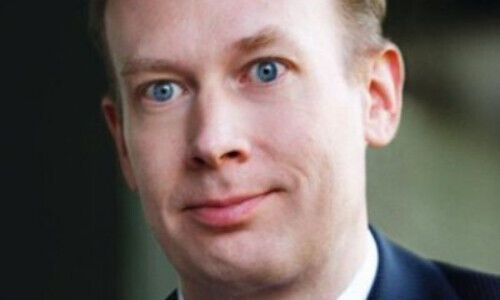The recent all-time high of $2,400 per ounce signals that the gold trade has entered a new phase. Degussa, a gold trading company, is preparing for further price increases and expanding into additional countries, as Andreas Hablützel discussed with finews.com.
Alongside the rising value of cryptocurrencies, the price of gold has significantly increased over the past few months, surpassing the $2,000 per ounce mark for the first time last March, and even briefly touching $2,400.
This development is remarkable as it involves two asset classes that are evolving outside the traditional financial system: gold, which has been a store of value for millennia, and digital assets, a recent phenomenon spanning a few decades.
Distrust in Paper Money

Andreas Hablützel, Degussa (Image: courtesy)
Andreas Hablützel, CEO of Degussa Goldhandel Switzerland, observes the latest price advances in gold with far greater calm than the current euphoria surrounding Bitcoin or Ethereum. He notes that this new surge reflects the latent and recently intensified distrust in our traditional currency system.
«Whether it's crypto or gold, people increasingly want to keep at least part of their wealth outside of the fiat system,» Hablützel says. Fiat money, derived from the Latin 'fiat' («let it be done»), refers to conventional paper and coin currency.
Three Factors and a New Pricing Power
«I believe it is a combination of three factors driving up the price,» Hablützel states. «First, we see China shifting its dollar reserves into gold. To achieve their target faster, they have accelerated the buildup of their gold reserves.»
Additionally, while emerging markets have historically been the largest end consumers, they could never exert pricing power due to the 'quick money' in the West. This has changed, as the influx of 'new' money in emerging markets now represents a significant pricing power.
Warning Issued 20 Years Ago
The second factor is indeed the global shift away from fiat currencies in favor of gold, as investors have less confidence in currencies like the euro due to ongoing and increasing economic problems in the EU.
Moreover, there is growing geopolitical uncertainty concerning Israel and Iran, which could lead to a potential conflict scenario in the Middle East – a risk that experts had pointed out 20 years ago.
Domino Effect as a Price Driver
For Hablützel, the development of gold prices is somewhat unexciting because, over longer periods, gold simply appreciates, which provides stability to a diversified portfolio if it includes between 5 and 15 percent gold. With this premise, regular price corrections are entirely manageable.
The three main factors now lead to a domino effect. Due to the growing geopolitical uncertainties in the Middle East, investors are increasing the gold content in their investment portfolios from about 5-7 percent to about 10-15 percent. «This is an additional price driver for gold that should not be underestimated,» says Hablützel.
Price Correction Expected Until the 'Summer Slump'
He currently considers the gold market 'overbought' again and anticipates a price correction of about $150 by the 'summer slump.' However, with the recent surge well above the $2,000 mark, gold has found a new level that is unlikely to be undercut soon.
«I believe that what we are currently seeing is just the beginning of a longer journey. This journey will progress slowly, not chaotically, and will not end in a crash,» the Degussa manager states. Confidence in currencies like the euro or the dollar will continue to decline, and investors will look to other opportunities to preserve the value of their money.
Many Banks Exiting the Gold Business
In light of the recent boom, it is somewhat ironic that many Swiss banks have exited the once-popular gold business, apparently because trading mostly physical bars no longer generates sufficient fee income. At most, a handful of banks, including UBS, Raiffeisen, and Zürcher Kantonalbank, still sell gold bars to the general public.
Specialized gold traders such as Degussa and other firms are stepping in to fill the gap, as finews.ch has previously reported. These companies offer a range of gold products that continue to see demand in Switzerland.
Planned International Expansions
«There is room in the market for all these specialized gold traders,» Hablützel emphasizes, also noting that Degussa has expanded its staff at its two Swiss locations in Zurich and Geneva over the past two years; Zurich now employs 20 people, and Geneva five.
Further expansions are planned, not in Switzerland, but outside of Europe. «We are considering entering other countries in 2025, including Singapore,» says Hablützel. Opening a branch in the Southeast Asian city-state would mark a return, as Hablützel admits, who is also responsible for the company's international presence. Degussa had previously opened a branch in Singapore in 2016 but closed it a few years later.
Focal Point for Family Offices and Wealth Managers
In its latest expansion, unlike before, the focus is no longer on retail or walk-in customers but is now clearly aimed at family offices, independent wealth managers, or other professional financial institutions, as Hablützel specifies.
With this realignment, the recent decision to no longer offer physical gold products such as chess pieces and boards or watches, pens, and other decorative items, but to focus on smaller and larger gold bars and on classic, well-known gold coins like Goldvreneli, Krugerrand, Canadian Maple Leaf, or American Eagle, was made.
Generational Change Completed
Both the expansion plans and the streamlining of the gold product offering are due to the new management of the Degussa Group, which has been in the hands of François von Finck since 2022, the son of the late patron August Baron von Finck, who had been involved in gold trading since 2010 and had acquired the naming rights of the Degussa Group to use them for the company founded 14 years ago, Degussa Goldhandel.
Thus, a generational change has quietly taken place, that is likely to reinvigorate the business with a millennia-old trading good. Initial signs are already evident.




































